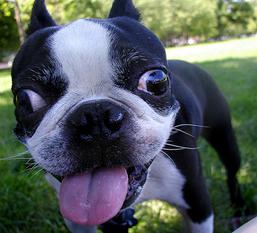DanBar Ranch
The Boston Terrier has at least two distinct forms of inherited cataract. One type has an onset before 6 months of age with rapid progression to complete opacity prior to 2 years old. The early onset cataract is inherited as an autosomal recessive mutation in the HSF4 gene (HSF4-1). A DNA test is available. A second type of cataract occurs after 4-5 years of age with variable progression. The genetic mutation responsible for this cataract is not yet known.
For early onset cataracts, a simple DNA test is available as a one time test. For adult onset cataracts, no test is available. Strabismus (eyes pointing outwards) is generally inherited in Boston terriers.
Health Testing: EYE DISEASE/CATARACTS
Strabismus is an eye condition in Bostons which the eyes point in the wrong direction. Rather than having both eyes pointed forward and parallel to the nose, dogs with strabismus may have eyes that turn inward toward the nose or outward away from the nose. An inward turning of the eye is referred to as esotropia, while an outward turning is called exotropia. With this condition it is only the direction of the eye that is affected – the position of the eye within the socket remains normal. It is possible for Boston Terriers and other dogs to develop strabismus in just one eye, though it is commonly seen in both. When both eyes turn outward it is called divergent strabismus and when they turn inward it is called convergent strabismus – dogs with convergent strabismus are often said to be cross-eyed or walleyed.
In cases where the condition is inherited it is often congenital, or present at birth. In Boston Terriers, strabismus is generally an inherited condition.
Symptoms of strabismus in Boston Terriers include one or both eyes pointing in an abnormal direction, uncoordinated movement of one or both eyes, mental dullness, lethargy, lack of appetite, tilting the head, differences in pupil size, falling or turning to one side, and seizures. In order to diagnose your dog with strabismus your vet will need to complete an ophthalmic examination as well as a neurological examination.
Yearly screening of eyes by specialist veterinarians can also detect severe and rapid-developing forms of corneal dystrophy which are common in Boston terriers.
The Boston Terrier has at least two distinct forms of inherited cataract. One type has an onset before 6 months of age with rapid progression to complete opacity prior to 2 years old. The early onset cataract is inherited as an autosomal recessive mutation in the HSF4 gene (HSF4-1). A DNA test is available. A second type of cataract occurs after 4-5 years of age with variable progression. The genetic mutation responsible for this cataract is not yet known.
Above: Boston with Strabismus.
TESTING AVAILABLE FOR EYE DISEASE
There are two main ways to screen breeding Boston terriers for eye disease. The first if DNA testing at birth (or anytime) a one time testing that will show if a dog is clear, a carrier or affected by genes for Juvenile Cataracts.
Second, yearly or every other year tests on breeding Bostons will allow an expert eye specialist veterinarian to determine the eye health of the breeding dogs.
The Orthopedic Foundation for Animals (OFA) offers listing of results.
Buyer beware...
I have spoken out for years that breeders who consider themselves "ethical" MUST screen their breeding dogs and MUST report to the OFA all results - pass or fail. Why? Because without that information researchers cannot help our breeds, and puppy buyers can't be made aware of the REAL risks they face for specific disease in the breed of their choice.
So why do so very few breeders take this simple but so important step for their dogs and breed? Sadly, the excuses are many... Some suggest the cost is prohibitive. But in reality, most puppy buyers would rather pay a slight increase in purchase price to thousands in veterinarian bills when they discover their dog has a preventable disease later in life.
Some "breeders" claim to do health testing but insist they don't feel the need to pay the small fee to register it with the OFA. It is hard to know if they are being truthful, as some breeders have been known to have ONE x-ray of a dog with excellent features, which they show to the unknowing puppy buyer as "proof" that which ever dog they need to be x-rayed, is, indeed, x-rayed. Add to that the fact that the average puppy buyer does not know what they are looking at in an x-ray, and will be fooled by whatever the "breeder" tells them. This is why the OFA has a panel of specialist evaluating the films!
Bottom line, a serious and ethical breeder SUPPORTS the OFA in the very important research they do. Sure, it hurts the ego to send in a dog you own or bred that may not pass a health screening, but the resulting information that gives researchers and fellow breeders is SO important to the welfare of the breed. Putting the breed first means walking the walk, not just talking the talk.




